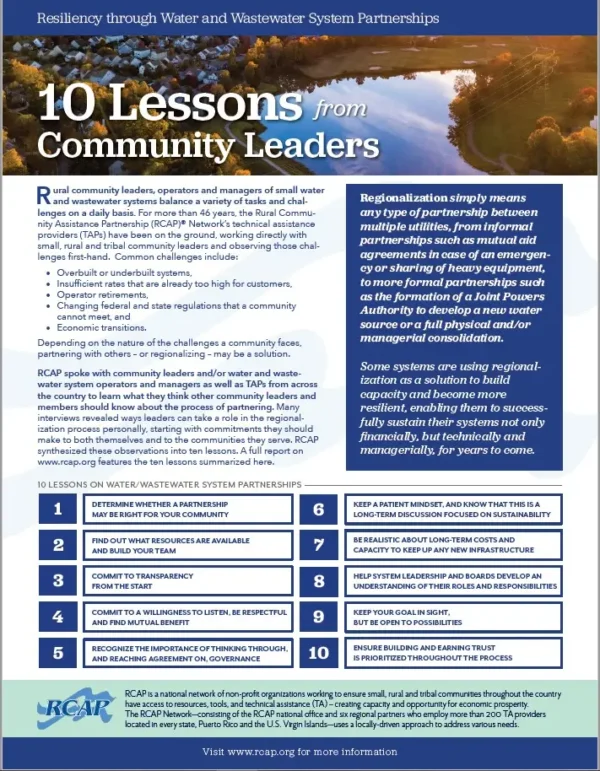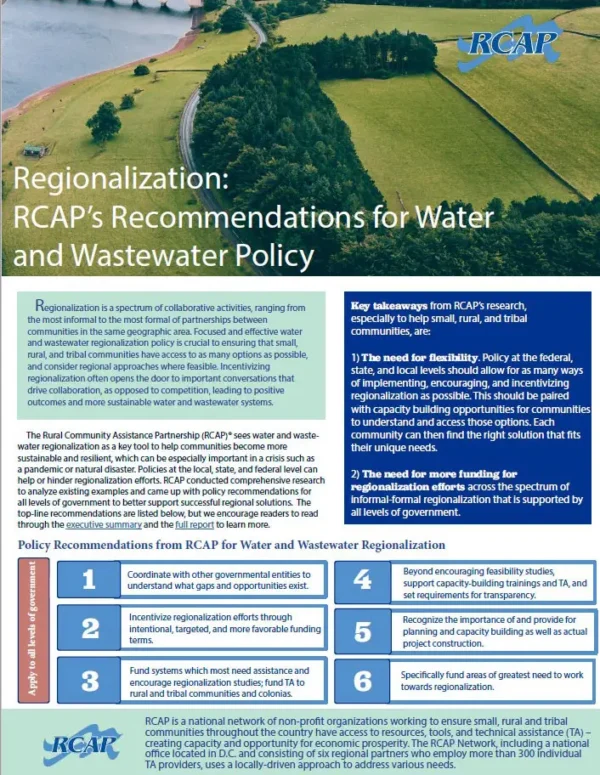Why Regionalization?
We believe regionalization helps to:
- Solve common challenges like access to affordable supplies, sharing the cost of certified operators, or making rates more reasonable.
- Build resiliency in the face of both predicted and unpredicted changes and events, such as changing population and demographic trends or natural disasters and other emergencies.
- Create a culture of collaboration (rather than competition) that enables utilities to lean on or support others, leading to better outcomes for all.
If you would like more information on regionalization, you can view our one-pager here.
In addition to our one-pager, we have a guide on regionalization. The guide will explain the diverse spectrum of regional collaboration options available, examples of how they have been implemented successfully including best practices, benefits, and barriers, as well as tools and resources to help navigate the process. This guidebook is meant for both community and water/wastewater utility leaders and staff as well as for the technical assistance providers (TAPs) that serve them. Access it here.
Regionalization Research
We’ve noticed the need for a better understanding of regionalization in small, rural, and tribal communities including the broad spectrum of activities that regionalization encompasses, how to go about it, and what to watch out for. With that in mind, we have undertaken a comprehensive research effort since 2019 to understand regionalization experiences at the community level in small, rural, and tribal communities across the nation and analyzed existing and potential policies at each level of government to develop practical findings and policy recommendations. The results of our work are a series of dynamic research reports on regionalization that we hope can be used in practical ways by both community leaders and policymakers at all levels of government.

Resiliency Through Water and Wastewater System Partnerships: 10 Lessons from Community Leaders
In March 2020, RCAP released a new research report, “Resiliency Through Water and Wastewater System Partnerships: 10 Lessons from Community Leaders,” which looks at community utility partnerships from a rural and tribal perspective. As small communities across the country seek solutions for common affordability, operational and compliance challenges, this research highlights the experiences of those who chose water and/or wastewater system partnerships as a solution. The report highlights 10 lessons from community leaders who undertook and/or facilitated regional collaboration (also called regionalization) – the successes they saw, the challenges they overcame, and the difficult questions they faced throughout the process.
Exec Summary
Regionalization Summit/Workshop - State College, Pennsylvania - Highlight Reel

Regionalization: RCAP's Recommendations for Water and Wastewater Policy
In May 2021, RCAP released a new research report, “Regionalization: RCAP’s Recommendations for Water and Wastewater Policy,” which focuses on local, state, and federal policies that encourage and those that hinder regional solutions and includes recommendations at all levels of government to better support regional solutions moving forward.
The report highlights 22 recommendations from RCAP that should be integrated into policy by decision makers. This research highlights:
- Top-line recommendations that can improve regionalization support at all levels of government.
- Two key takeaways: the need for flexibility and the need for more funding for regionalization efforts, including technical assistance.
- Provides examples and perspectives from work happening on the ground
- Findings from a compilation of state policies that impact regionalization for drinking water and wastewater systems; information is available in Appendix A
Need more information and assistance?
If you are interested in learning more about how RCAP can help small utilities collaborate, please contact Sarah Buck, RCAP Senior Director of Programs: [email protected]; 978-894-4123.